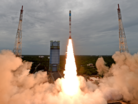Related
India and Bangladesh on Saturday moved to bolster their defense relationship and signed agreements for expanding cooperation in maritime security, ocean economy, space, and telecommunication sectors, as New Delhi tries to present itself as a regional power and a counterweight to China.
The agreements were signed during Bangladesh Prime Minister Sheikh Hasina's visit to India, the first foreign leader to visit New Delhi since Narendra Modi became the country's prime minister for a third term two weeks ago.
Modi welcomed Bangladesh's decision to join his Indo-Pacific Oceans Initiative to expand and facilitate regional cooperation of India's maritime neighbors. He said the deals with Dhaka were part of his country's pursuit of a neighborhood-first approach.
Bangladesh also enjoys good ties with China, its major trade partner mostly for raw materials. But maintaining a close relationship with Beijing is challenging for Bangladesh, which also balances diplomatic and trade relationships with India and the United States, China's main rivals.
Bangladesh's garment industry, which brings in more than 80% of foreign currency from exports, is heavily dependent on China for raw materials.
Hasina told reporters in New Delhi that the two countries decided to boost the sharing of river waters and cooperation in the power and energy sectors.
She also met Indian industry leaders and invited them to invest in Bangladesh which plans to develop bigger ports, waterways, rail, and road connectivity. India loaned Bangladesh $8 billion in the last eight years, to help expand that infrastructure.
Since Sheikh Hasina's Awami League party came to power in 2009, she has acted to address New Delhi's concern about Indian militant groups taking shelter in Bangladesh.
However, an agreement on sharing the waters of the River Teesta remains elusive. The question of illegal immigration from Bangladesh to India also has dogged bilateral ties for years.
India is Bangladesh's largest export destination in Asia. Trade between the two countries touched $15.9 billion in the financial year 2022-23.
New Delhi mainly exports cotton, motor vehicles, sugar, iron, steel, aluminum, electrical and electronic equipment to Bangladesh. It imports cereal, pulp paper and board, cement, and raw hides from Bangladesh.
The agreements were signed during Bangladesh Prime Minister Sheikh Hasina's visit to India, the first foreign leader to visit New Delhi since Narendra Modi became the country's prime minister for a third term two weeks ago.
Modi welcomed Bangladesh's decision to join his Indo-Pacific Oceans Initiative to expand and facilitate regional cooperation of India's maritime neighbors. He said the deals with Dhaka were part of his country's pursuit of a neighborhood-first approach.
Bangladesh also enjoys good ties with China, its major trade partner mostly for raw materials. But maintaining a close relationship with Beijing is challenging for Bangladesh, which also balances diplomatic and trade relationships with India and the United States, China's main rivals.
Bangladesh's garment industry, which brings in more than 80% of foreign currency from exports, is heavily dependent on China for raw materials.
Hasina told reporters in New Delhi that the two countries decided to boost the sharing of river waters and cooperation in the power and energy sectors.
She also met Indian industry leaders and invited them to invest in Bangladesh which plans to develop bigger ports, waterways, rail, and road connectivity. India loaned Bangladesh $8 billion in the last eight years, to help expand that infrastructure.
Since Sheikh Hasina's Awami League party came to power in 2009, she has acted to address New Delhi's concern about Indian militant groups taking shelter in Bangladesh.
However, an agreement on sharing the waters of the River Teesta remains elusive. The question of illegal immigration from Bangladesh to India also has dogged bilateral ties for years.
India is Bangladesh's largest export destination in Asia. Trade between the two countries touched $15.9 billion in the financial year 2022-23.
New Delhi mainly exports cotton, motor vehicles, sugar, iron, steel, aluminum, electrical and electronic equipment to Bangladesh. It imports cereal, pulp paper and board, cement, and raw hides from Bangladesh.
(Catch all the Business News, Breaking News, Budget 2024 Events and Latest News Updates on The Economic Times.)
Subscribe to The Economic Times Prime and read the ET ePaper online.
Read More News on
(Catch all the Business News, Breaking News, Budget 2024 Events and Latest News Updates on The Economic Times.)
Subscribe to The Economic Times Prime and read the ET ePaper online.






